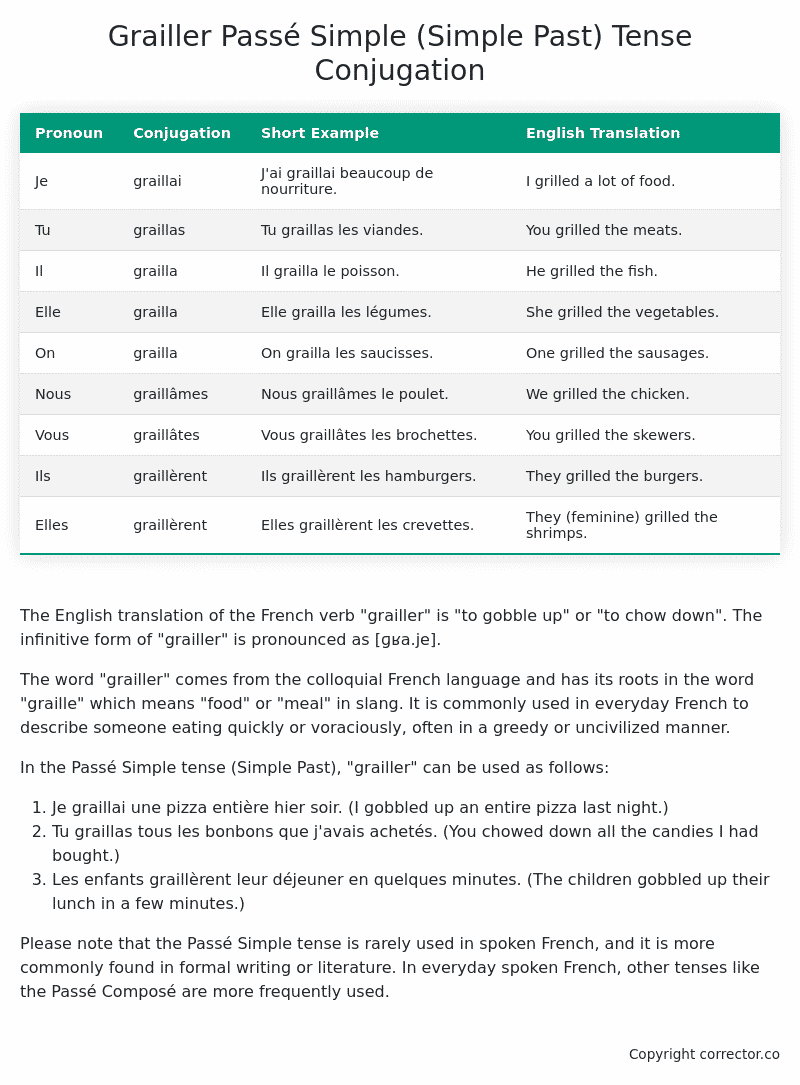Passé Simple (Simple Past) Tense Conjugation of the French Verb grailler
Introduction to the verb grailler
The English translation of the French verb “grailler” is “to gobble up” or “to chow down”. The infinitive form of “grailler” is pronounced as [ɡʁa.je].
The word “grailler” comes from the colloquial French language and has its roots in the word “graille” which means “food” or “meal” in slang. It is commonly used in everyday French to describe someone eating quickly or voraciously, often in a greedy or uncivilized manner.
In the Passé Simple tense (Simple Past), “grailler” can be used as follows:
- Je graillai une pizza entière hier soir. (I gobbled up an entire pizza last night.)
- Tu graillas tous les bonbons que j’avais achetés. (You chowed down all the candies I had bought.)
- Les enfants graillèrent leur déjeuner en quelques minutes. (The children gobbled up their lunch in a few minutes.)
Please note that the Passé Simple tense is rarely used in spoken French, and it is more commonly found in formal writing or literature. In everyday spoken French, other tenses like the Passé Composé are more frequently used.
Table of the Passé Simple (Simple Past) Tense Conjugation of grailler
| Pronoun | Conjugation | Short Example | English Translation |
|---|---|---|---|
| Je | graillai | J’ai graillai beaucoup de nourriture. | I grilled a lot of food. |
| Tu | graillas | Tu graillas les viandes. | You grilled the meats. |
| Il | grailla | Il grailla le poisson. | He grilled the fish. |
| Elle | grailla | Elle grailla les légumes. | She grilled the vegetables. |
| On | grailla | On grailla les saucisses. | One grilled the sausages. |
| Nous | graillâmes | Nous graillâmes le poulet. | We grilled the chicken. |
| Vous | graillâtes | Vous graillâtes les brochettes. | You grilled the skewers. |
| Ils | graillèrent | Ils graillèrent les hamburgers. | They grilled the burgers. |
| Elles | graillèrent | Elles graillèrent les crevettes. | They (feminine) grilled the shrimps. |
Other Conjugations for Grailler.
Le Present (Present Tense) Conjugation of the French Verb grailler
Imparfait (Imperfect) Tense Conjugation of the French Verb grailler
Passé Simple (Simple Past) Tense Conjugation of the French Verb grailler (You’re reading it right now!)
Passé Composé (Present Perfect) Tense Conjugation of the French Verb grailler
Futur Simple (Simple Future) Tense Conjugation of the French Verb grailler
Futur Proche (Near Future) Tense Conjugation of the French Verb grailler
Plus-que-parfait (Pluperfect) Tense Conjugation of the French Verb grailler
Passé Antérieur (Past Anterior) Tense Conjugation of the French Verb grailler
Futur Antérieur (Future Anterior) Tense Conjugation of the French Verb grailler
Subjonctif Présent (Subjunctive Present) Tense Conjugation of the French Verb grailler
Subjonctif Passé (Subjunctive Past) Tense Conjugation of the French Verb grailler
Subjonctif Imparfait (Subjunctive Imperfect) Tense Conjugation of the French Verb grailler
Subjonctif Plus-que-parfait (Subjunctive Pluperfect) Tense Conjugation of the French Verb grailler
Conditionnel Présent (Conditional Present) Tense Conjugation of the French Verb grailler
Conditionnel Passé (Conditional Past) Tense Conjugation of the French Verb grailler
Conditionnel Passé II (Conditional Past II) Tense Conjugation of the French Verb grailler
L’impératif Présent (Imperative Present) Tense Conjugation of the French Verb grailler
L’impératif Passé (Imperative Past) Tense Conjugation of the French Verb grailler
L’infinitif Présent (Infinitive Present) Tense Conjugation of the French Verb grailler
L’infinitif Passé (Infinitive Past) Tense Conjugation of the French Verb grailler
Le Participe Présent (Present Participle) Tense Conjugation of the French Verb grailler
Le Participe Passé (Past Participle) Tense Conjugation of the French Verb grailler
Struggling with French verbs or the language in general? Why not use our free French Grammar Checker – no registration required!
Get a FREE Download Study Sheet of this Conjugation 🔥
Simply right click the image below, click “save image” and get your free reference for the grailler Passé Simple tense conjugation!

Grailler – About the French Passé Simple (Simple Past) Tense
Formation
Usage
Narration
Historical Context
Interactions with other tenses
Passé Composé
Imparfait
Conditional and Subjunctive
Summary
I hope you enjoyed this article on the verb grailler. Still in a learning mood? Check out another TOTALLY random French verb conjugation!


